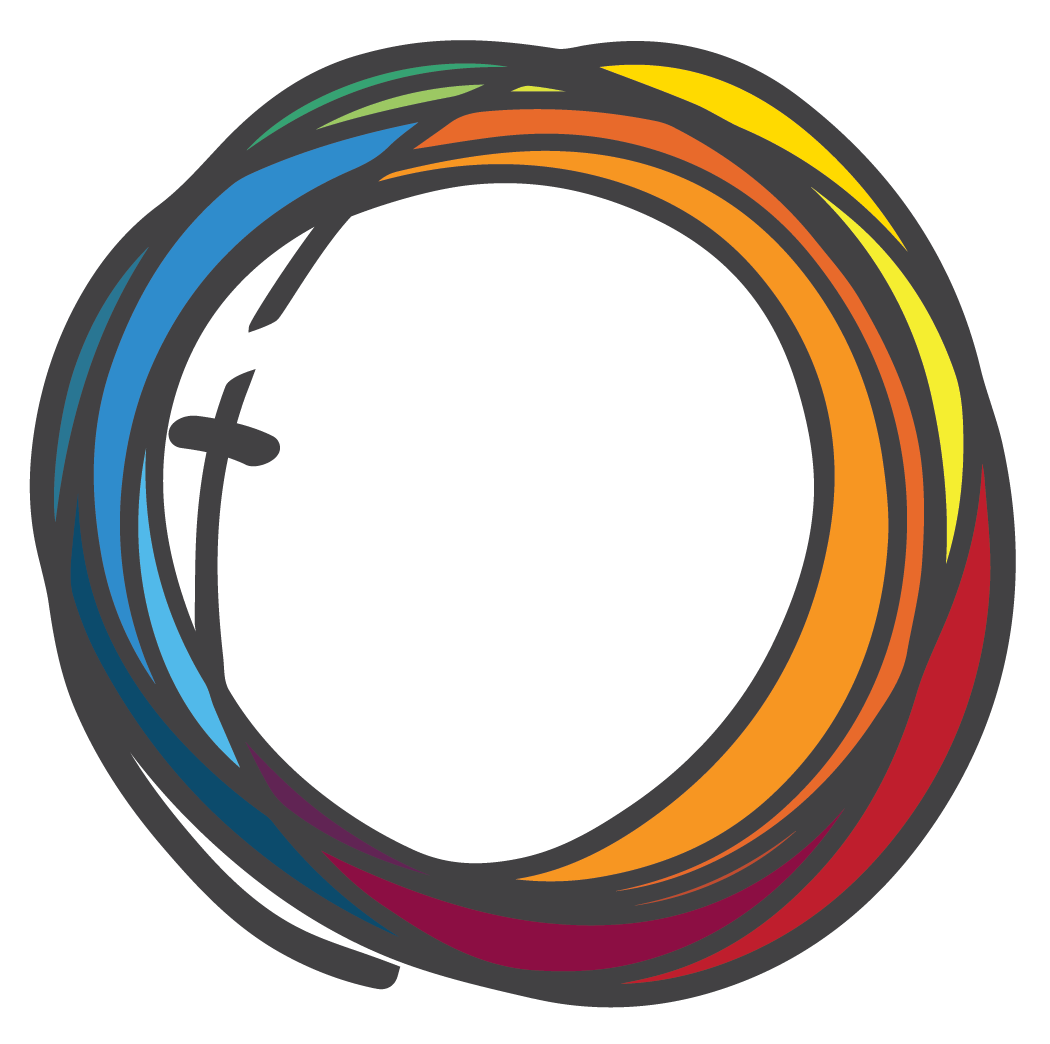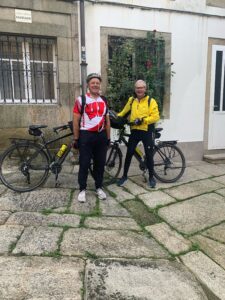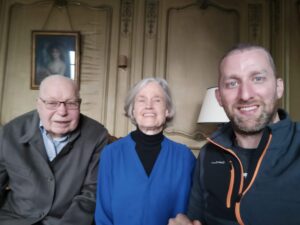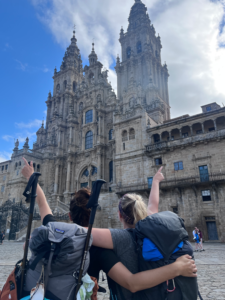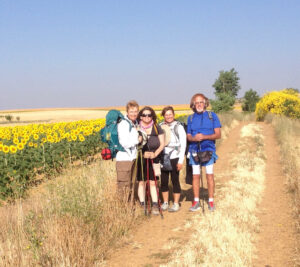Imagine sweeping mountain views, picturesque villages with cobblestone streets, golden wheat fields dancing in the breeze under endless skies.
These images only represent part of the beauty to behold on the Camino de Santiago, a network of intersecting trails all over Western Europe ultimately leading to Santiago de Compostela, Spain — home to the tomb of St. James. Pilgrims have traversed these sacred paths dating back to the Middle Ages.To see a deeper beauty, pilgrims must endure hardships on the trails: blisters, sickness, becoming lost, and much more.
Is all of this worth it? Five Eastbrookers answer with a resounding “yes!” Bryan Browning, Lisa Buethe, Liz Carver, Dan Ryan, and Audrey Smith have each traversed the Camino Francés, beginning in France. They say it is not just a beautiful trek, but a journey of the body, mind, and soul, revealing a depth of community and a dependence on both God and others.
To use a timeworn cliché: it’s about the journey, not the destination. Part of what makes these paths sacred is how God shows His provision in tangible ways amidst the hardships. A common phrase on the trails is “the Camino provides.”
Recently, this group of Eastbrookers gathered to discuss their Camino stories and provide a glimpse of the provision of God they witnessed while on their journeys.
➜Mac Littel: What were some reasons you decided to tackle the Camino?
DAN: I hiked the Camino on my own in February of 2005. I’m someone who likes the combination of challenge and wilderness, and I was really looking for a “mountain top experience.” Additionally, my wife and I both felt led to go overseas, so while I was on the Camino, I was planning to pray through where I felt God leading us.
LISA: I did it in 2013 with my sisters and my father. We did it because my sister had survived cancer — when she was sick, it was a really difficult time. She came to us with this idea — she said, ‘if I make it through, I want to do the Camino.’ When she became tumor-free, we were like, okay, the miracles are starting! It was a very spiritual and intense time in my life.
LIZ: I walked a single day of the Camino in 2012, and that day was such a powerful experience, it made me want to do the whole thing. I read a lot about pilgrimage, and realized this is a tenet of faith that is missing in America and in modern times. I really wanted to do it in 2020, but that didn’t happen! When Audrey and I finally went this past summer [2022], God showed up in a big way.
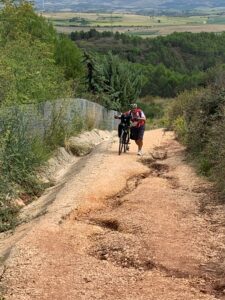 AUDREY: Liz threw it out to our friend group in 2019. After two years of praying about it, saving for it, and learning more about it, this was finally our year to go. Liz and I took walks together to train, and she would ask, ‘how are you preparing spiritually?’ which was good, because I had been spending all my time preparing physically. I showed up on the Camino with these big questions I wanted answered, and was open to hearing from God.
AUDREY: Liz threw it out to our friend group in 2019. After two years of praying about it, saving for it, and learning more about it, this was finally our year to go. Liz and I took walks together to train, and she would ask, ‘how are you preparing spiritually?’ which was good, because I had been spending all my time preparing physically. I showed up on the Camino with these big questions I wanted answered, and was open to hearing from God.
➜ML: Audrey, Liz, Dan, and Lisa all walked the Camino — but Bryan, you rode on your bike!
BRYAN: I rode it in September 2021 with my friend Duane — we had done adventures together before. Duane and I started doing some research and found out that about 20 percent of those that do the Camino ride it and so we thought that would be fun. Like Audrey, I was prepared really well for the physical parts, and I was open to the rest — and God surprised me.
➜ML: How did God surprise you? Share a Camino miracle or win.
LISA: Neither my [78-year-old] father or my sister who had recovered from cancer got one blister. She never even said she was tired! It was amazing.
BRYAN: On the first day, I found out my friend didn’t ride at the same speed as me. At one point, I was far ahead of him and took a wrong turn — but didn’t realize it until it was too late. I ended up having to carry my bike up this big hill because I was o the trail. The day was almost ending and I found myself praying, because I had to go all the way back the way I came—another 15 miles—and I was already exhausted. I found a little opening at the top of the hill, squeezed through with my bike, and ended up back where I was supposed to be! I started singing the song lyrics, “God will make a way when there is no way.” My attitude changed dramatically. I had an energy like I hadn’t had for a long time and ew back to meet Duane. I started praying about patience after that.
➜ML: It sounds like there was a transformation for you. Did anybody else experience something like that?
DAN: I wanted to do the Camino alone, in winter [when there are fewer pilgrims], and spend a lot of time with God. I got to the hostel on the first night and the only other person there was a 72-year-old Frenchman who spoke English. He was really nice, but I didn’t want anyone to bother me. The next morning, I left before him, pushed harder and a little further, trying to lose him. At five o’clock that night, he walked into the hostel where I was staying! This kept happening the first few days of my journey. That was a transformation for me — I had my own agenda and then moved into thinking, ‘maybe God has something completely di fferent for me.’ It didn’t dawn on me until halfway through the Camino: one of my grandfathers died when I was five, the other really struggled with alcohol. So I guess I didn’t really have a grandfather who was present and wanted to hang out and talk — and here’s this older guy who is my grandparents’ age and who wants to go to dinner with me! The Camino provides. I didn’t even know I had that hole, and here God used this man. Fifteen years later, I met up with him in Paris — we hugged and sat and talked about the Camino.
AUDREY: Well, I got COVID at the beginning of our trip! I didn’t test until a few days into our hike, trying to rationalize away my symptoms and blame them on altitude, heat, or travel. It was really stressful because we had to immediately change our plans and get o trail to find a place to stay. Liz booked us a hotel so we could isolate — the hotel employees were so kind, and Liz took care of me for two days. It was really hard because I like to be very independent, and I had to rely on another person. God really humbled me through this experience: I had prepared physically for the Camino for months, and I thought my body was ready for anything! It was also a huge blessing because there were wildfires happening in the next two sections of the Camino — the people ahead of us were evacuated and could not hike it, and we missed all of the danger. God’s provision.
LIZ: I went into the Camino with my little agenda — I had planned everything, read everything. But it was much harder than I’d thought. I was in my apps constantly, in my book, in my head way too much about the trail and how hard it would be. By the end of the Camino, I felt a shift from, “I need to know what’s around the bend” to being excited about what’s coming next. I learned to release control and just be in the present moment. Another humbling shift: I went in very prepared for and thought I was going to have a personal “mountain top experience” on this spiritual pilgrimage. Instead, what God gave me was the most physical challenge — and one of the most communal experiences — of my life.
➜ML: It has become clear from this discussion that community is central to the pilgrim experience. What did God teach you about taking the journey through life together?
 LIZ: God taught me how much I need community. The Camino was such a strange paradox: I have to walk this on my own, yet we are doing it together. I had to put one foot in front of the other, yet I did the whole thing with Audrey and couldn’t have done it without her. Probably because I am so fiercely independent, the idea that it wasn’t one or the other, but both at the same time [was really powerful].
LIZ: God taught me how much I need community. The Camino was such a strange paradox: I have to walk this on my own, yet we are doing it together. I had to put one foot in front of the other, yet I did the whole thing with Audrey and couldn’t have done it without her. Probably because I am so fiercely independent, the idea that it wasn’t one or the other, but both at the same time [was really powerful].
LISA: Three days before [the end], my feet were hurting, and I was just weeping. My father told me, ‘we really can’t tell people you wouldn’t finish — you just have to get up.’ He was very gentle about it, and it motivated me to keep going and finish.
DAN: I think the pilgrimage is an allegory for life: as you go, diff erent people come in and out of your life for di fferent seasons, for diff erent purposes. I had my own ideas, my thoughts, my ambitions, but I got something so much better. The pilgrimage and the journey of life is understanding that process, and moving toward living life as a gift.
The paradox of pilgrimage is that it is about the journey and the destination, moving forward as an individual and being part of a community forging ahead together. Serving one another, depending on others, and receiving from them. It’s about both the spiritual and the physical; our bodies play an integral part in our experiences of God. Accepting these paradoxes, the intersection of seemingly opposite things, is where transformation happens. When, like these five Eastbrook Camino pilgrims, we have the courage to let go of our perceived control and practice openness with God, we learn the pilgrim way.
The Camino taught Audrey, Bryan, Dan, Lisa, and Liz so much — and we, too, can take away much from their stories: an emphasis on the communal nature of our faith, practicing trust in God when we have our own expectations, and being open to what God will do in our lives when we surrender and humble ourselves.
As they say on the Camino, God provides. ■
Megan “Mac” Littel (née Carlson) is a longtime Eastbrooker who, along with her husband Ethan, leads a small group for the 20s and 30s ministry.
Recommended Posts
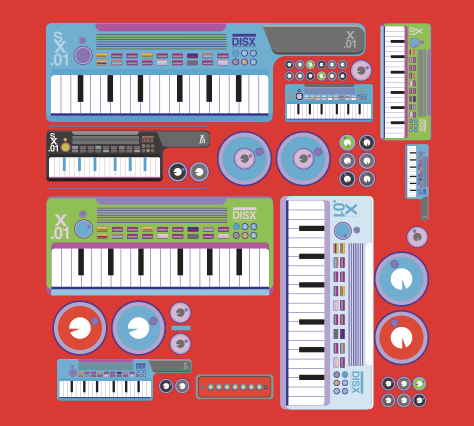
Summer Mixtapes
June 7, 2024
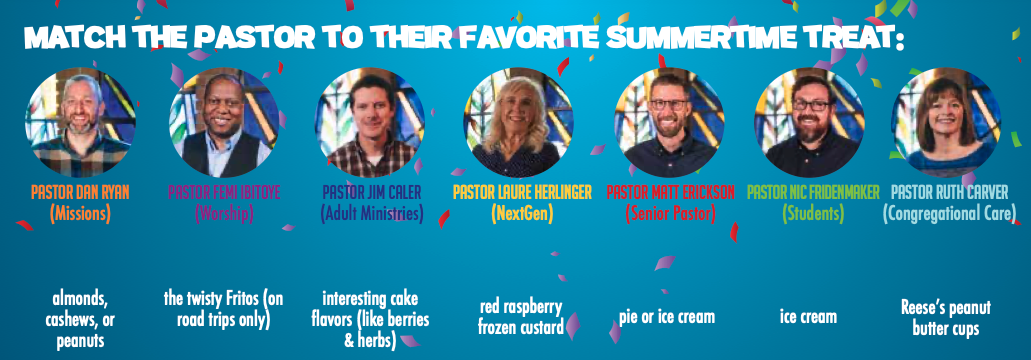
Pastors: They’re Just Like Us!
June 7, 2024
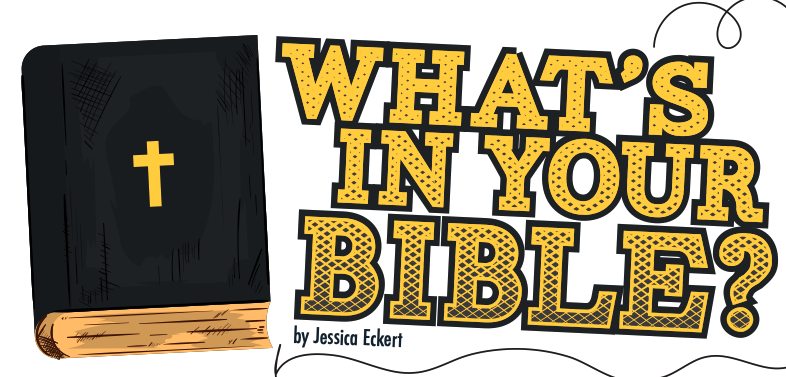
What’s in Your Bible?
June 7, 2024


